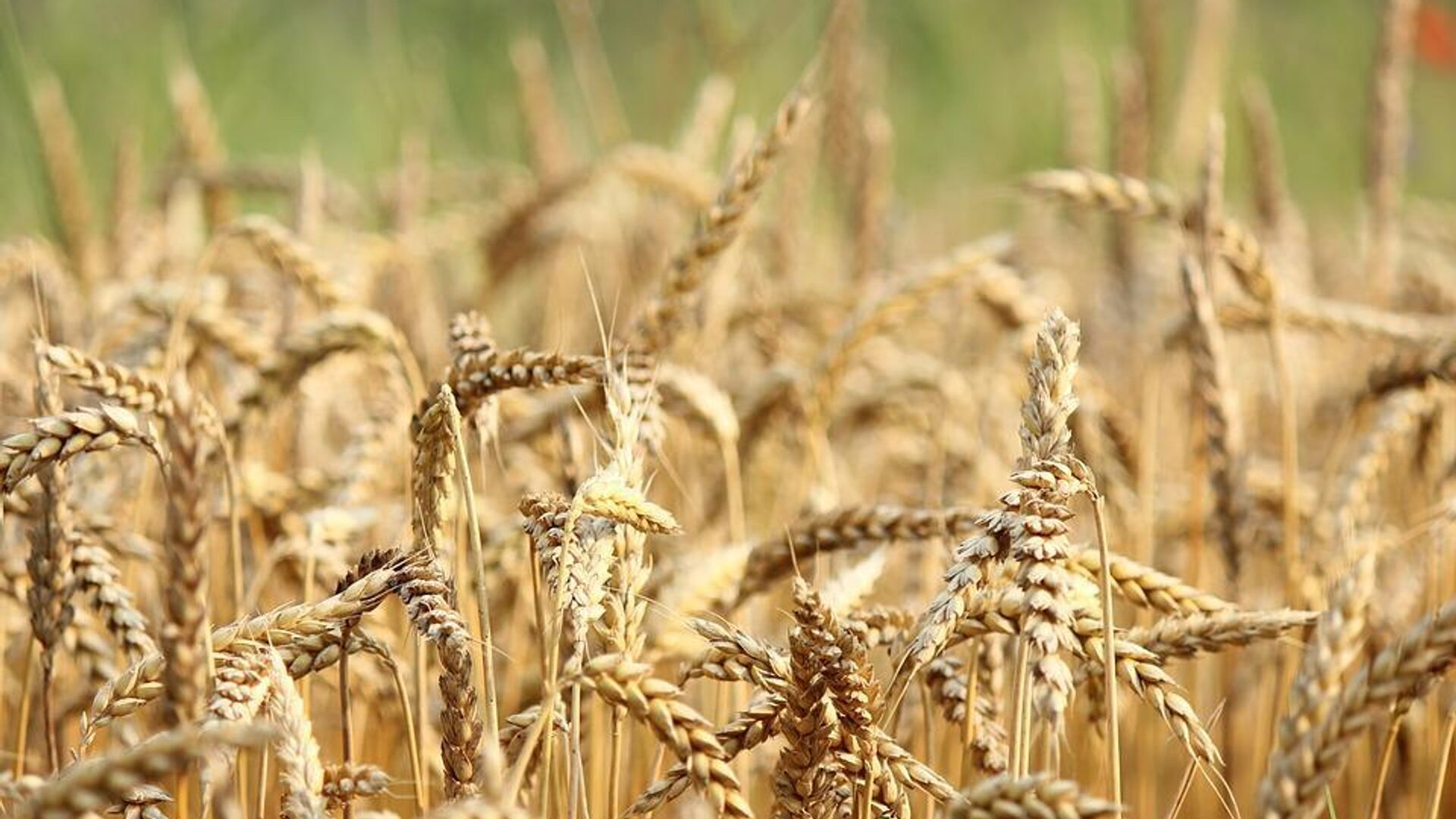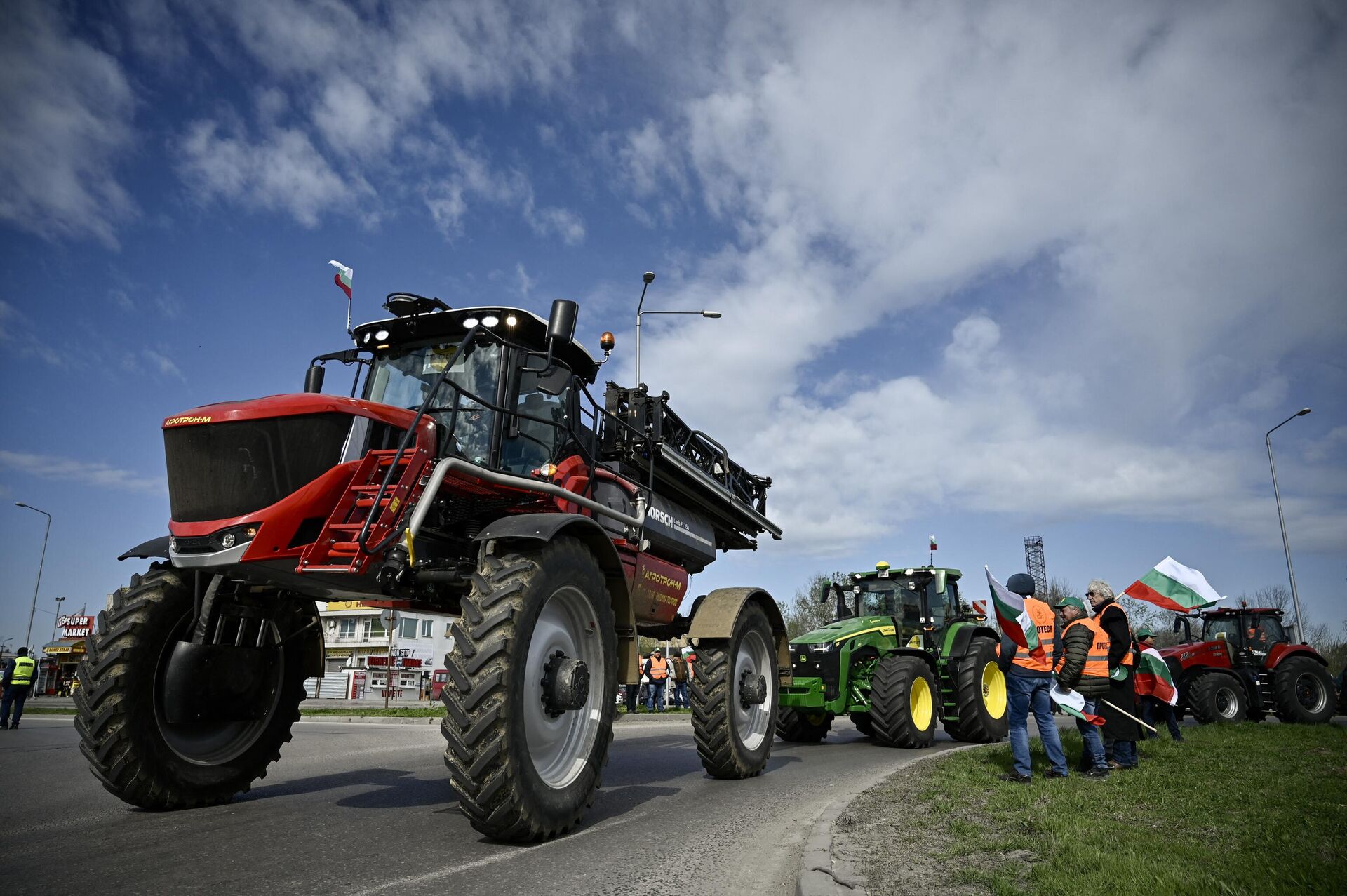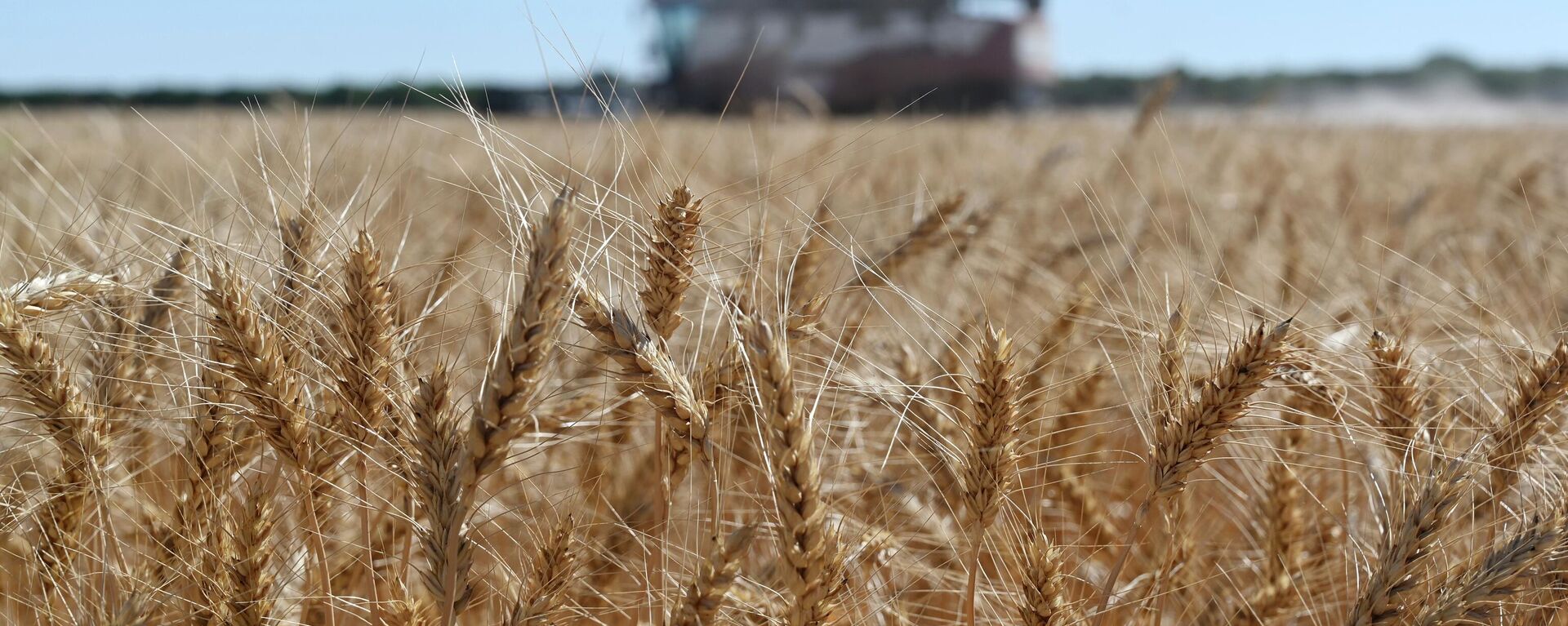https://sputnikglobe.com/20230402/influx-of-ukraines-cheap-grain-to-europe-fuels-anger-erodes-support-for-kiev-regime-1109048118.html
Influx of Ukraine's Cheap Grain to Europe 'Fuels Anger, Erodes Support' for Kiev Regime
Influx of Ukraine's Cheap Grain to Europe 'Fuels Anger, Erodes Support' for Kiev Regime
Sputnik International
The Istanbul Grain Deal was arranged by the UN and Turkiye between Russia and Ukraine in July 2022 to ease exports of grain and fertilizer from Black Sea ports... 02.04.2023, Sputnik International
2023-04-02T12:52+0000
2023-04-02T12:52+0000
2023-04-02T13:53+0000
world
european union (eu)
grain
ukraine
energy crisis
western sanctions
ukraine crisis
https://cdn1.img.sputnikglobe.com/img/07e6/05/19/1095758210_0:14:960:554_1920x0_80_0_0_630f456637dce8a64c242da5c30a91df.jpg
Eastern member-states of the European Union are beginning to question continued support for Ukraine as they cope with a glut of grain that has been triggering anger among their communities, according to US media reports.Europe was supposed to be a transit territory for Ukraine’s cheap grain, originally meant for poor countries in Africa, but the huge influx of duty-free imports is staying on the continent and, hitting local farmers in Poland, Romania, Slovakia, Hungary and Bulgaria.Ukraine is also reportedly increasingly using several routes for crop export besides the Black Sea, such as by rail, road and river.In Romania - one of the European bloc's largest corn and wheat producers, and one of the countries which originally was eager to facilitate more than half of Ukraine's grain exports by land - imports rose to 570,000 tons last year, having previously hovered close to zero, according to Razvan Filipescu, vice-president of the Association of Farmer Producers in the Dobrogea region, as cited by the media.The country's farmers recently protested in Brussels, in front of the European Commission building, demanding compensation for their losses.In Bulgaria, where almost 80 percent of the sunflower crop for last year is still unsold, along with more than 3 million tons of 2022 wheat, angry farmers blocked border crossings with neighboring Romania for several days.Reports have indicated that Slovakia has been urging the EU to collaborate with the UN's World Food Program to guarantee that Ukrainian grain travels through the bloc to other destinations.With prices plummeting and storage facilities overflowing, the rage of farmers witnessing their harvests being overlooked in favor of Ukraine’s cheap grain may trigger political consequences for many of the nations involved. For example, in light of looming elections in Poland and Slovakia, authorities are starting to wonder how their decisions may translate into votes. Thus, in Slovakia, former Prime Minister Robert Fico's Smer-SD (Direction-Social Democracy) party, which has called for ending military aid to neighbouring Ukraine, has already grabbed the lead in an opinion poll ahead of elections in September.Poland, a country zealously funneling aid to the Kiev regime amid the ongoing US-driven proxy war against Russia, is now forced to contend with the fact that supplies of Ukraine’s grain are threatening local livelihoods.According to him, the European Commission ought to set a limit on how much Ukrainian grain enters the European Union.Recently, Bulgaria, Hungary, Poland, Romania and Slovakia penned a letter to European Commission President Ursula von der Leyen, calling on the bloc to consider restricting imports from Ukraine.Everything that European countries have done to toe the line set by Washington and its allies regarding the Ukraine crisis, be it sanctions on Russia over its special military operation in that country, or sending military aid to Kiev, has subsequently backfired. Funding the Ukraine war machine against Russia has resulted in an energy crisis, austerity in Europe that set off waves of strikes and protests sweeping the continent. Furthermore, the EU's own stockpiles of weapons have been hollowed out. As for the Black Sea Grain Initiative, European countries receive much more Ukrainian grain than African nations or other countries in need of grain, Andrey Suzdaltsev, political scientist and Associate Professor at the HSE Department of International Relations earlier told Sputnik. He added that the West sells Ukrainian grain to poorer countries at higher prices and benefiting from it.Thus, during the first six months of the deal, it turned out that only 3 percent of Ukrainian grain went to countries where there is a shortage of food, whereas the rest of the grain was exported to Europe.Furthermore, Russia stated on 18 March that it would extend it only for 60 days because of the lack of progress in the issue of the supply of Russian food and fertilizers. Moscow noted that Russian shipping companies and banks continue to face sanctions and barriers introduced by Washington, Brussels and London that supposedly do not apply to Russian food and fertilizers.
https://sputnikglobe.com/20230307/europe-uses-grain-deal-to-profiteer-from-africa-expert-says-1108137213.html
https://sputnikglobe.com/20230318/russia-agreed-to-extend-grain-deal-only-for-60-days-moscow-stresses-1108547395.html
ukraine
Sputnik International
feedback@sputniknews.com
+74956456601
MIA „Rossiya Segodnya“
2023
News
en_EN
Sputnik International
feedback@sputniknews.com
+74956456601
MIA „Rossiya Segodnya“
Sputnik International
feedback@sputniknews.com
+74956456601
MIA „Rossiya Segodnya“
eastern member-states, european union, question support for ukraine, grain glut, transit territory, ukraine’s cheap grain, meant for poor countries in africa, huge influx of duty-free import, hitting local farmers, poland, romania, slovakia, hungary, bulgaria,
eastern member-states, european union, question support for ukraine, grain glut, transit territory, ukraine’s cheap grain, meant for poor countries in africa, huge influx of duty-free import, hitting local farmers, poland, romania, slovakia, hungary, bulgaria,
Influx of Ukraine's Cheap Grain to Europe 'Fuels Anger, Erodes Support' for Kiev Regime
12:52 GMT 02.04.2023 (Updated: 13:53 GMT 02.04.2023) The Istanbul Grain Deal was arranged by the UN and Turkiye between Russia and Ukraine in July 2022 to ease exports of grain and fertilizer from Black Sea ports amid the ongoing hostilities. It has since been extended twice, with Moscow warning that most vessels do not reach the world's poorest countries and end up in Europe.
Eastern member-states of the European Union are beginning to question continued
support for Ukraine as they cope with a glut of grain that has been triggering anger among their communities, according to US media reports.
Europe was supposed to be a transit territory for
Ukraine’s cheap grain, originally meant for poor countries in Africa, but the huge influx of duty-free imports is staying on the continent and, hitting local farmers in Poland, Romania, Slovakia, Hungary and Bulgaria.
Ukraine is also reportedly increasingly using several routes for crop export besides the Black Sea, such as by rail, road and river.
In Romania - one of the European bloc's largest corn and wheat producers, and one of the countries which originally was eager to facilitate more than half of Ukraine's grain exports by land - imports rose to 570,000 tons last year, having previously hovered close to zero, according to Razvan Filipescu, vice-president of the Association of Farmer Producers in the Dobrogea region, as cited by the media.
The country's farmers recently protested in Brussels, in front of the European Commission building, demanding compensation for their losses.
In Bulgaria, where almost 80 percent of the sunflower crop for last year is still unsold, along with more than 3 million tons of 2022 wheat, angry farmers blocked border crossings with neighboring Romania for several days.
"It's not working, the grain is staying right here," Emil Macho, chairman of the Slovak Agriculture and Food Chamber, was cited as saying in reference to the Istanbul Grain Deal.
Reports have indicated that Slovakia has been urging the EU to collaborate with the UN's World Food Program to guarantee that Ukrainian grain travels through the bloc to other destinations.
With prices plummeting and storage facilities overflowing, the rage of farmers witnessing their harvests being overlooked in favor of Ukraine’s cheap grain may trigger political consequences for many of the nations involved. For example, in light of looming elections in Poland and Slovakia, authorities are starting to wonder how their decisions may translate into votes. Thus, in Slovakia, former Prime Minister Robert Fico's Smer-SD (Direction-Social Democracy) party, which has called for ending military aid to neighbouring Ukraine, has already grabbed the lead in an opinion poll ahead of elections in September.
Poland, a
country zealously funneling aid to the Kiev regime amid the ongoing
US-driven proxy war against Russia, is now forced to contend with the fact that supplies of Ukraine’s grain are threatening local livelihoods.
"We must help Ukraine in the transport and sale of grain to countries outside the EU. But this cannot be done at the expense of Polish farmers and local markets," Polish Prime Minister Mateusz Morawiecki was cited as saying in a social media post.
According to him, the European Commission ought to set a limit on how much Ukrainian grain enters the European Union.
Recently, Bulgaria, Hungary, Poland, Romania and Slovakia penned a letter to European Commission President Ursula von der Leyen, calling on the bloc to consider restricting imports from Ukraine.
Everything that European countries have done to toe the line set by Washington and its allies regarding the Ukraine crisis, be it sanctions on Russia over its special military operation in that country, or sending
military aid to Kiev, has subsequently
backfired. Funding the Ukraine war machine against Russia has resulted in an energy crisis, austerity in Europe that set off waves of strikes and protests sweeping the continent. Furthermore, the EU's own stockpiles of weapons have been hollowed out.
As for the Black Sea Grain Initiative, European countries receive much more Ukrainian grain than African nations or other countries in need of grain, Andrey Suzdaltsev, political scientist and Associate Professor at the HSE Department of International Relations earlier told Sputnik. He added that the West sells Ukrainian grain to poorer countries at higher prices and benefiting from it.
Thus, during the first six months of the deal,
it turned out that
only 3 percent of Ukrainian grain went to countries where there is a shortage of food, whereas the rest of the grain was exported to Europe.
Furthermore, Russia stated on 18 March that it would extend it only for 60 days because of the lack of progress in the issue of the supply of Russian food and fertilizers. Moscow noted that Russian shipping companies and banks
continue to face sanctions and barriers introduced by Washington, Brussels and London that supposedly do not apply to Russian food and fertilizers.





